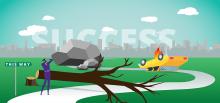STORY BY NANCY JOSEPH, AUGUST 2019: PERSPECTIVES NEWSLETTER

Roadblocks are part of life. How one copes with them can be a factor for future success.MEDIA CREDIT: RICHARD STEGEMAN
As director of security for Microsoft, James Louie often talks to audiences about his work. But a speaking request from University of Washington Professor Steve Herbert was a bit different. Herbert wanted Louie to skip his usual topics and talk to a UW class about something more personal: his failures.
Louie’s talk was part of “Learning from Failure,” a course for undergraduates majoring in law, societies, and justice (LSJ). Initially an experiment, the course is now a regular offering in LSJ. Each week a different LSJ alum visits the class — eight in all — to talk candidly about their professional journey and the challenges they’ve faced along the way. In the final class session, students share insights they’ve gained through the conversations.
“The point of the course is to show that failure is unavoidable, and that learning how to be resilient in the face of failure is key,” says Herbert, Mark Torrance Professor in LSJ, who created the course.
Guest speakers have been remarkably open about their low moments—everything from failing the bar exam to botching an important job interview to allowing debt to accumulate. They also discuss other challenges of professional life, such as advocating for yourself while remaining a team player, maintaining the values instilled in LSJ, managing gender dynamics in the workplace, and finding a successful work-life balance.
It is unrealistic to think that you will not have not-so-stellar moments. It’s what you do in response to those moments that is important and telling of your future.
Louie (BA, LSJ, 1987) shared an early career disappointment, a missed opportunity that required him to totally rethink his plans for the future. At first he was hesitant to tell his story. “I wasn’t ashamed or embarrassed,” he says. “I was hesitant because of some lingering emotion I had.” But he found that speaking to the students was cathartic, and he made a repeat visit to the class the next quarter. “Letting go of baggage is a good thing,” he says. “I enjoyed speaking with the students and hope that sharing my real-world experiences helps them in their journeys.”
Private criminal defense attorney Lauren Wegener (BA, LSJ, Philosophy, 2004) also enjoyed the experience despite revisiting painful moments from her past. “When Professor Herbert asked me to speak, there were definitely challenges I’ve experienced that I considered outright failures,” she says. Wegener spoke to the class about a particularly disappointing law school rejection, interviews gone awry for law internships, and other roadblocks. “I wanted them to know that it was not only okay to fail, but that it is assumed. It is unrealistic to think that you will not have not-so-stellar moments. It’s what you do in response to those moments that is important and telling of your future.”

The course was "one of these off-the-wall ideas that you try and see what happens," says Steve Herbert, who has now offered the course four times.
For students anxious about what comes next, that message has been inspiring. Nandina Babic (2019, LSJ, Political Science) admits that her fear of failure has often meant choosing the safe route — enrolling only in courses she thought she could ace, for example, and foregoing social activities to study more. Hearing how successful alumni dusted themselves off after disappointments and grew from those experiences was instructive.
“Their stories showed me how being vulnerable comes from a place of strength,” Babic says. “It took this class and our speakers’ candor for me to shift my thinking, to realize that there is not only value in failure but perhaps a degree of necessity because of its ability to lead to insight, resilience, and growth.”
Classmate Sabrina Page (BA, LSJ, Psychology, 2019) was nearing graduation and overwhelmed with possible next steps when she took the course. Learning that alumni she admired were once in her shoes, facing the same challenges, eased her anxiety. “Hearing how much their paths changed from their original plans, I realized that I shouldn’t let not knowing exactly what I want to do in my career stop me from trying something, because most people swerve in their career anyway,” she says. “It seemed that the trials everyone went through didn’t derail them so much as make them stronger, both as people and as professionals.”
Such insights please Herbert, who admits that the course was “one of these off-the-wall ideas that you try and see what happens.” Having offered the class four times, Herbert believes it not only prepares students for bumps in the road, but also provides realistic expectations for the entry-level jobs they are likely to be offered after graduating. Many guest speakers describe first, second, and even third jobs in which they felt undervalued and uninspired. But they also share ways they used those jobs as springboards to more interesting opportunities. “I believe that’s one of the most valuable lessons for students,” says Herbert. “It’s a good reality check.”
Since taking the class, Babic and Page have graduated. One day they may return to campus to share their own career stories. But first they need to be in the working world, risking failure on their way to success.
“I know that risk-taking will not come easily,” says Babic, “but I am glad to have reached a point where I am more excited than fearful of taking on new opportunities.”
